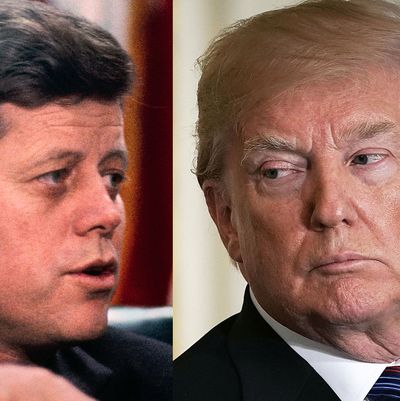
Of all of the president’s authoritarian gestures, you’d figure the one that would trouble his otherwise mostly satisfied corporate supporters is the man’s willingness to attack fellow business types publicly, most notably and savagely during his still-developing war on Amazon and its CEO, Jeff Bezos. Yes, most of them are too busy chowing down on tax cuts and enjoying deregulation to complain. But the U.S. Chamber of Commerce did finally bestir itself to issue a statement:
“It’s inappropriate for government officials to use their position to attack an American company,” said Neil Bradley, executive vice president and chief policy officer for the Chamber of Commerce, the nation’s largest business group.
“The U.S. economy is the world’s most powerful because it embraces the free enterprise system and the rule of law, whereby policy matters are handled through recognized policymaking processes. The record is clear: Deviating from those processes undermines economic growth and job creation.”
This sounds more like an economics lecture than a rebuke to a would-be tyrant, and as Ron Brownstein points out, it would have been a lot sharper, louder, and sooner had a Democratic president been trying to drive a company’s stock prices down via Twitter.
As it happens, there is a precedent for a Democratic president going “to war” with an individual company, or at least a small group of companies in the same industry: John F. Kennedy’s very public battle with steel companies in 1962 after U.S. Steel led several of its peers into a repudiation of an agreement to avoid price increases. The agreement also involved the industry’s unions, which agreed to restraint in wage demands, and was brokered by Kennedy’s Labor secretary, Arthur Goldberg.
Kennedy was enraged at what he privately called a “double-cross,” and went public with his anger, as Peggy Noonan recalled many years later:
At a news conference the next day he called the steel companies’ actions “a wholly unjustifiable and irresponsible defiance of the public interest” by “a tiny handful of steel executives whose pursuit of private power and profit exceeds their sense of public responsibility.” He implied they were unpatriotic in a time of national peril.
And the administration, including the president’s famously “ruthless” brother and Attorney General, did more:
Kennedy ordered the Defense Department to shift its steel purchases from U.S. Steel to companies that hadn’t raised prices. The Justice Department under Attorney General Robert Kennedy launched an antitrust investigation, summoned a federal grand jury, and sent FBI agents to the homes and offices of steel executives.
The companies backed down.
So the question remains: Is what Trump’s doing different from or worse than what Kennedy did?
While there are some similarities, it should be noted that however big and influential Amazon is today, it’s small potatoes in terms of its position in the overall economy when compared to the steel industry’s position in the early 1960s. It was regarded as a “basic industry” (along with automobiles and possibly textiles) whose pricing decisions would have an immediate and enormous impact on inflation. The deal Goldberg cut with “Big Steel” and its unions was part of what was called a “jawboning” strategy that was less disruptive than the wage and price controls many liberals favored (and that were finally imposed by Richard Nixon in 1971). And in suddenly abandoning the deal, U.S. Steel’s Roger Blough was in Kennedy’s view stabbing him in the back personally while threatening the stability of the U.S. economy.
And while Kennedy’s goal in going after U.S. Steel — compliance with the original agreement on steel pricing — was clear and limited, it’s not at all clear what Trump wants Amazon to do other than maybe ceasing to exist.
In his famously tweeted denunciations of Amazon, Trump does cite company business strategies that he considers destructive.
The issue of taxation of online sales is larger and older than Amazon, of course, as is the threat of e-commerce to brick-and-mortar businesses. Who can blame Amazon for taking advantage of long-standing public policies or cutting a deal with USPS? Why attack this one company? And if it is violating laws — antitrust laws, let’s say — why not direct the appropriate authorities to investigate, and if appropriate prosecute, these violations instead of trying to scare away investors with an implied threat of some sort of extra-legal action?
One answer, of course, is that Trump’s vendetta has little to do with Amazon and everything to do with Bezos’s other big property, as Gabriel Sherman reports:
Even Trump’s allies acknowledge that much of what’s fueling Trump’s rage toward Amazon is that Amazon C.E.O. Jeff Bezos owns The Washington Post, sources said. “Trump doesn’t like The New York Times, but he reveres it because it’s his hometown paper. The Washington Post, he has zero respect for,” the Republican close to the White House said. While the Post says that Bezos has no involvement in newsroom decisions, Trump has told advisers he believes Bezos uses the paper as a political weapon.
Now, it’s obviously not a good thing if it turns out that Trump’s authoritarian behavior toward a particular business enterprise is actually best explained by his authoritarian desire to suppress a newspaper he doesn’t like. And it takes the Trump-versus-Amazon saga far, far from what JFK did in 1962. So far as we know, U.S. Steel didn’t own a major newspaper and Kennedy was satisfied by its decision to abide by its earlier agreement to hold down prices.






























